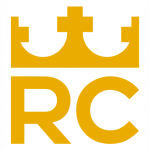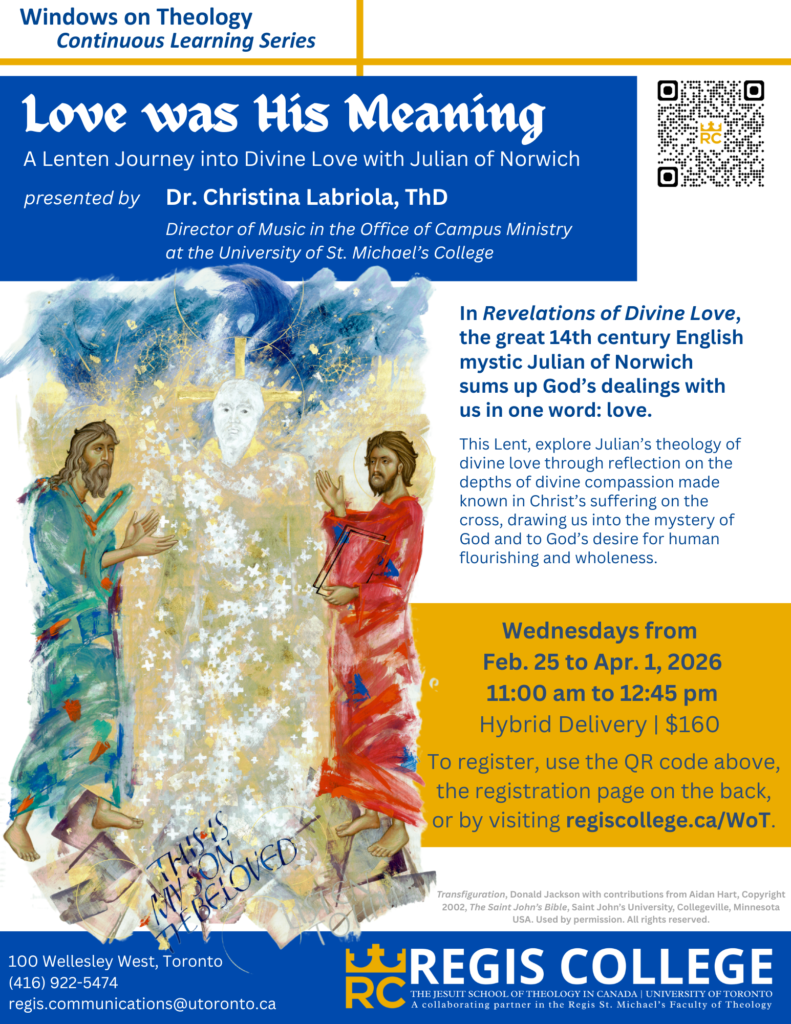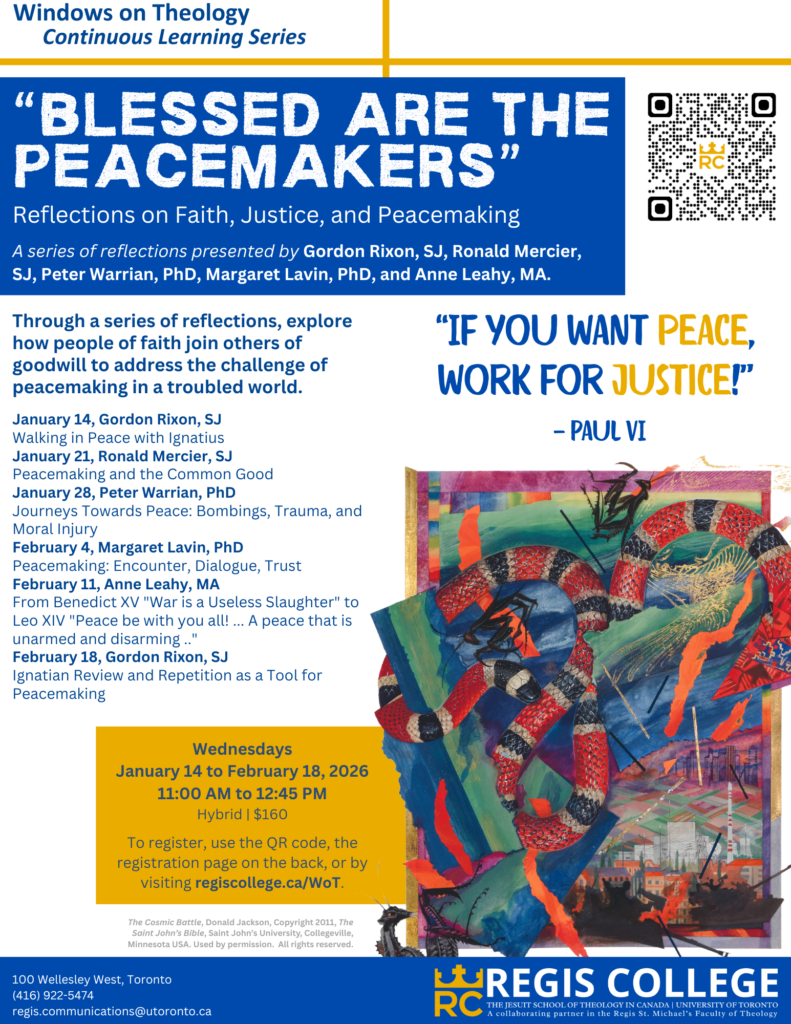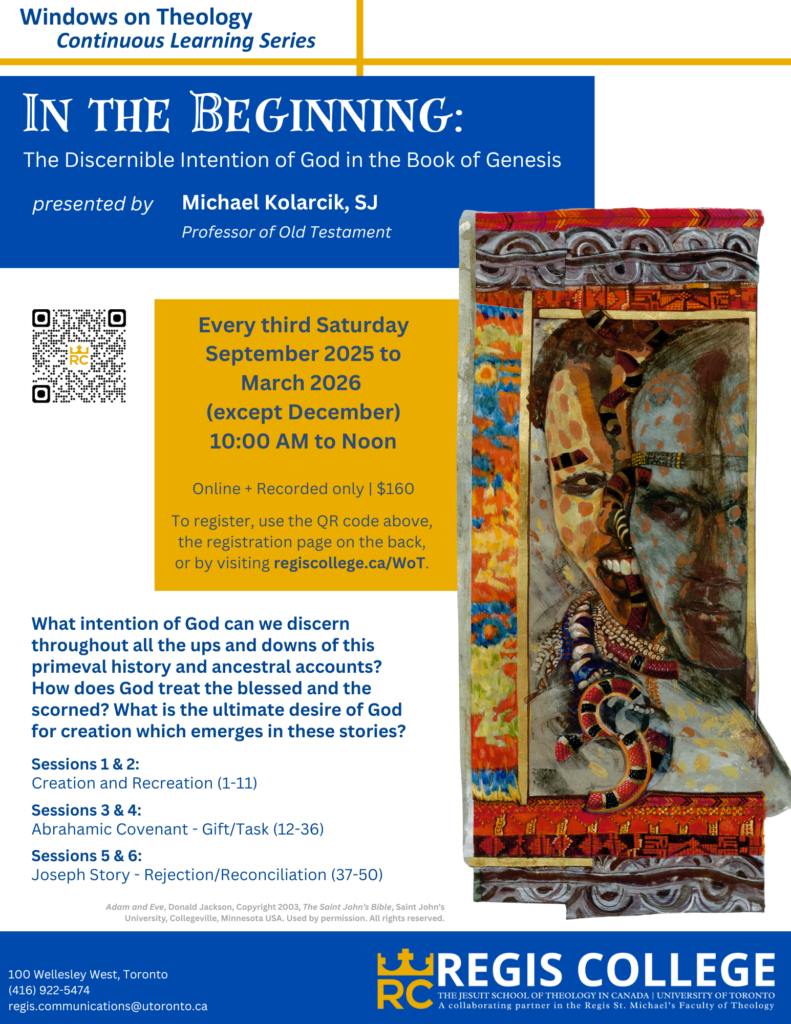



In Revelations of Divine Love, the great 14th century English mystic Julian of Norwich sums up God’s dealings with us in one word: love. Her remarkable vision probes the depths of divine compassion made known in Christ’s suffering on the cross, drawing us into the mystery of God and to God’s desire for human flourishing and wholeness. This Lent, explore Julian’s theology of divine love through reflection on its key themes: Christ’s Passion and the mystical dimension of suffering, the redemptive work of the Trinity, the problem of sin and God’s promise of true comfort, and Jesus as Mother.
This course is offered as a hybrid course. Participants who wish to attend in-person will gather in Regis College St. Joseph Chapel. Participants who wish to attend virtually will use the Zoom link provided. The Zoom link is the same for each class. All participants will receive a Zoom conferencing link in the confirmation email and again in the weekly email reminders.
Register online by clicking the button below. A credit card is required. Please read the conditions of enrolment before registering.
Register OnlineRegister by mail by downloading the registration form and completing by hand. Enclose cheque payable to “Regis College” and mail to Regis College, 100 Wellesley Street West, Toronto, Ontario, M5S 2Z5.
Download Registration Form
“If you want peace, work for justice.” – Paul VI. Through a series of reflections, explore how people of faith join others of goodwill to address the challenge of peacemaking in a troubled world. Topics include: Ignatian spirituality, Catholic social teaching, the common good, modern just war theory, and reconciliation with Indigenous communities.
January 14 (Gordon Rixon, SJ)
Walking in Peace with Ignatius
January 21 (Ronald Mercier, SJ)
Peacemaking and the Common Good
January 28 (Peter Warrian, PhD)
Journeys Towards Peace: Bombings, Trauma, and Moral Injury
February 4 (Margaret Lavin, PhD)
Peacemaking: Encounter, Dialogue, Trust
February 11 (Anne Leahy, MA)
From Benedict XV “War is a Useless Slaughter” to Leo XIV “Peace be with you all! … A peace that is unarmed and disarming ..”
February 18 (Gordon Rixon, SJ)
Ignatian Review and Repetition as a Tool for Peacemaking
This course is offered as a hybrid course. Participants who wish to attend in person will gather in Regis College St. Joseph Chapel. Participants who wish to attend virtually will use the provided Zoom link. The Zoom link is the same for each class. All participants will receive a Zoom conferencing link in the confirmation email and again in the weekly email reminders. All classes will be recorded and available to all participants for one month after the last class. Due to scheduling concerns, some presenters may present online to the in person gathering in St. Joseph Chapel.
Register online by clicking the button below. A credit card is required. Please read the conditions of enrolment before registering.
Register OnlineRegister by mail by downloading the registration form and completing by hand. Enclose cheque payable to “Regis College” and mail to Regis College, 100 Wellesley Street West, Toronto, Ontario, M5S 2Z5.
Download Registration Form
What intention of God can we discern throughout all the ups and downs of this primeval history and ancestral accounts? How does God treat the blessed and the scorned? What is the ultimate desire of God for creation which emerges in these
stories?
Weeks 1 & 2: Creation and Recreation (1-11)
Weeks 3 & 4: Abrahamic Covenant – Gift/Task (12-36)
Weeks 5 & 6: Joseph Story – Rejection/Reconciliation (37-50).
This course is offered online and recorded only, with optional watch parties to take place at Regis College. The Zoom link is the same for each class. All participants will receive a Zoom conferencing link in the confirmation email and again in the weekly email reminders.
Register online by clicking the button below. A credit card is required. Please read the conditions of enrolment before registering.
Register OnlineRegister by mail by downloading the registration form and completing by hand. Enclose cheque payable to “Regis College” and mail to Regis College, 100 Wellesley Street West, Toronto, Ontario, M5S 2Z5.
Download Registration FormThis course will provide an opportunity for theological reflection on music from a Christian perspective, claiming music’s real potential to become an occasion of encounter with God.
Explore the intricate interplay between climate change, science, and theology.
Join Sister Gill Goulding, CJ, for a series of engaging tea-time conversations over Lent, delving into the theological foundations of the 2023-24 Synod on Synodality and how we can carry forward the synodal journey beyond the October 2024 session.
Glimpse into founding moments of the Society of Jesus (the Jesuits) exploring its early-modern place in spirituality, education, mission fields, fine arts, and the tumultuous political spheres of Europe.
Architecture gives tangible, meaningful expression to a culture’s belief, values, hopes, and aspirations. The Christian architecture shaping Sacred Spaces responds to external influences and the changing ways we understand our relationship to God and creation. Participants learn to understand their places of worship and how they support or detract from the sacred and sacramental life of the parish.
The course draws on the distinction between mondalisation (transnational cultural pluralism) and globalisation (global monocultural hegemony) to explore the roles of religion and faith in discovering humanity’s higher purpose and addressing systemic injustice. Focused through discussion of regional theologies in Asia and Africa and world-wide indigenous movements, the course engages interreligious dialogue to heighten awareness of encounter and social reconciliation. The discussion of indigeneity addresses the experience of residential schools in Canada.
The Psalms have long been a major source of prayer for the Jewish and Christian communities alike. Why do they remain so contemporary and relevant? What makes them so moving and at times unnerving as well? This 8-week online course delves into the mysteries, the challenges, and the beauty of the Psalms as a source for prayer and theological reflection.
Today’s Christians are called to walk with a wounded world whose culture has become increasingly uncivil and polarized. Resources drawn from the Spiritual Exercises of St. Ignatius, as well as from the Society of Jesus’s reflection on its mission oriented to justice and reconciliation in service of the faith, offer both a path to personal conversion and tools for accompanying our fellow travelers and offering Christ’s healing.
Colleagues from across the University of Toronto and beyond reflect on the relationships among art, justice, theology, and the sacred.
September 20 – Timothy Schmalz, Reflections on “Let the Oppressed Go Free.”
September 27 – Sean Mulrooney, Visio Divina in the 21st Century.
October 4 – Walter Deller, A Splendid Fragment: J.S. Bach’s opening Chorus for BWV 50, Cantata for the Feast of St. Michael and All Angels.
October 11 – Lesley Higgins, But Where Does Hopkins Take Us?
October 18 – Gilles Mongeau, S.J., Recovering the Body as Sacrament: Aquinas at the Roots of Modern Dance.
October 25 – James Bird, Language and Shape in the Dene Language.
November 1 – Katharine Lochnan, The Sublime, The Beautiful and the Industrial Revolution: The Ethics and Aesthetics of Pollution.
November 8 – John Dadosky, Bringing Beauty Back into Art.
November 15 – Gordon Rixon, S.J., Agency, Providence, and Beauty: Makoto Fujimura’s Nihonga Slow Art.
From the moment that Pope Francis announced his name after the papal election, it was clear that the reform of the church would be central to his papal agenda. The Lord had told Francis of Assisi, “Repair my Church,” and Francis would attempt to do just that. The floorplan for Francis for this repair would be a missionary church in which all are called to be “missionary disciples.” This course will examine how Pope Francis is accomplishing his goal.
Professor Gordon Rixon, SJ, President-Designate of Regis College, identifies the resources of Ignatian mystical spirituality and contemporary narrative theory to shape liberating religious stories that contribute to social transformation in a post-secular context. The course engages contemporary social theory to address issues of racism and other forms of systematic injustice and introduces transdisciplinary approach to ecological, social, cultural, and ecclesial reconciliation.
Humanity currently faces an ecological crisis of unprecedented magnitude. As Pope Francis notes, this crisis is a manifestation of a deeper crisis of modernity that includes “ethical, cultural, and spiritual” dimensions. We are all called to heal relationships between ourselves and the wider Earth community. We need not only transformed technologies, policies, and economics to do so, but also a practical and ethical know-how. Ecological wisdom capable of discerning a path towards just and loving relationships is paramount.
Although the Old Testament is a collection of written works spanning many centuries, there is a common thread uniting all its books. It is a continual account of God’s call, the imperfect response of human beings, and God’s overwhelming compassion and mercy. There is a constant tension between the call to love and serve God and others, and the all too human tendency towards selfishness. Throughout the many instances of human failure, God is faithful. The spiritual journey of the Old Testament imparts wisdom that is both human and divine. We will journey through the Old Testament with the accompaniment of the rabbis and the Church Fathers.
This journey examines the story of the Christian faith in the place where it all began. Many scholars consider the land of Israel the fifth Gospel. Immersing yourself in this land will bring you closer to the history, archeology, anthropology, culture, people and politics that spans over thousands of years. Israel is the Holy Land; a country where you will see the Bible come to life in ways that will touch your life today. Expect a Blessing!
Storied rationality, metaphors and symbols, the knowing of the sensing body, the passions, the senses, movement as rationality, approaches to the paschal mystery… all coming together as practical reason moving us out of suffering into flourishing, now and forever. This 6-week course explored an uncommon meaning of rationality, namely, the logic of movement toward the good in terms of one’s sensed bodily vitality.
Euthanasia. Physician-Assisted Death. Withdrawing Treatment. With the rise of medical technology and the recent legalization of medically assisted death in Canada, the “ethics” of dying can seem daunting. This course examined ethical issues in end-of-life care and draw on relevant Catholic Church Teaching
for guidance.
This course surveyed some important authors on the topic of love: St. Paul, C.S. Lewis, Rosemary Haughton, Erich Fromm, Rollo May, Robert Johnson, Scott Peck, Bernard Lonergan and Buddhist perspectives.
This course invited students into the way of doing theology practiced by the Fathers of the Church, so that our contexts and situations may be lit by the same fire which animated their own. The Fathers, almost without exception, were pastors. Their theology, therefore, is fundamentally one of encounter and relationship. Looking to the Fathers helps us to discover what it means for us to be bearers of the Tradition today, so that we can more adequately and humbly appropriate the task of mercy to which we have all been called.
St. Paul spent much of his life travelling over land and sea, spreading the Good News. The ‘In the Footsteps of Paul’ study tour will follow Paul’s steps beginning at the crossroads of three continents on the Mediterranean Island of Cyprus, then travelling on to the mythical Islands of Malta and continuing on to “Roma Aeterna” the eternal city of Rome and beyond.
In Cyprus we will step back in time with visits to prehistoric settlements, Roman mosaics and villas, Tombs of the Kings, Churches, UNESCO sites and glorious beaches. We will travel along the coast to Paphos as Saul did before he became Paul.
In Malta, we will stroll on meandering narrow streets, visit medieval towers, and the oldest known human structures in the world. We will visit St. Paul’s Island where in 60 C.E. Paul was shipwrecked on his way to Rome. The welcome he received is described in Acts 28: ‘After we had reached safety, we then learned that the island was called Malta. The natives showed us unusual kindness. Since it had begun to rain and was cold, they kindled a fire and welcomed all of us round it.’
Italy will be the final country on the tour as we follow Paul to Rome where he died after years of imprisonment. Highlights are ancient ruins that evoke the power of the former Roman Empire including Vatican City, Michelangelo’s Sistine Chapel frescoes, and much more in Rome.
‘Whatever is true, whatever is honorable, whatever is just, whatever is pure, whatever is pleasing, whatever is commendable, if there is any excellence, if there is anything worthy of praise, think about these things’ Phil. 4:8
Regis College is located at 100 Wellesley Street West, Toronto, near the corner of Queen’s Park Crescent East. Regis College is on the 94 Wellesley TTC bus route and a short walk (south) from the Museum subway station. Public parking is available in the University of St. Michael’s College parking lot on St. Joseph Street, one block north of Regis College. The venue is accessible.
For more information about the Windows on Theology Continuous Learning Series, please contact regis.communications@utoronto.ca or call 416-978-0067
Before registering, please read the conditions of enrolment:
For assistance in registering, please contact regis.communications@utoronto.ca or call 416-922-5474 x 229.
